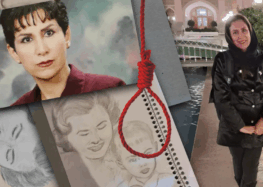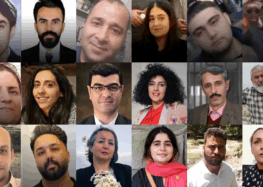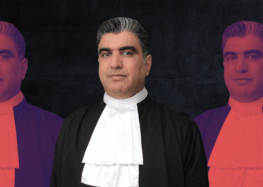Kurdish Prisoners Still Face Execution, Despite Possible Retrial

Loghman and Zanyar Moradi were accused of “involvement in the murder of the Marivan Friday Imam’s son” and “moharebeh (enmity with God)” in 2009, charges they never accepted, calling the case a scenario fabricated by the Intelligence Ministry.
A new case with a new charge has been established at the Penal Court against Zanyar Moradi and Loghman Moradi, two Kurdish prisoners sentenced to death on “moharebeh (enmity with God)” charges, Zanyar Moradi’s father told the International Campaign for Human Rights in Iran. Eghbal Moradi told the Campaign that due to pressure from human rights organizations to prevent the execution of Zanyar and Loghman Moradi on moharebeh charges, the Iranian Government is now reviewing their case under different charges, so that the two men can be executed based on Qisas (retribution) Law instead.
Loghman and Zanyar Moradi were accused of “involvement in the murder of the Marivan Friday Imam’s son” and “moharebeh (enmity with God)” in 2009, charges they never accepted, calling the case a scenario fabricated by the Intelligence Ministry.
“But both my son and Loghman have repeatedly said that they were forced to confess to the murder under torture. All Marivan people know that these two did not kill the Marivan Friday Imam’s son. They were once sentenced to death on moharebeh charges, but now that there has been a lot of noise around their execution, they want to sentence them to death on murder charges based on Qisas,” Eghbal Moradi told the Campaign.
Last year, the two men published a letter describing the severe psychological and physical torture they had endured, during which they had made false confessions. Security forces arrested Zanyar Moradi, 23, and Loghman Moradi, 25, on August 2, 2009, for the July 2009 murder of the son of the Marivan Friday Imam. They spent nine months inside the Sanandaj Intelligence Office Detention Center, under severe physical and psychological pressure to confess. Approximately six months later, the two prisoners were transferred to the Sanandaj Central Prison and then to Evin Prison’s Intelligence Ministry Ward 209.
In an interview with the International Campaign for Human Rights in Iran, lawyer and human rights defender Mahnaz Parakand said, “Based on the letters the two prisoners published, as well as their video message in which they say they were forced to confess, the two prisoners should be tried again. According to Article 38 of the Iranian Constitution, extracting confessions under torture is illegal and invalid. As they said they have been forced to make confessions under torture, the Judge is legally bound to pay attention to the suspects’ statements. They should be investigated again under free circumstances, away from duress, and in presence of their lawyers, and after the Judge is fully satisfied with the investigation, he can issue the verdict.”
“I stress that when a suspect denies his confessions and insists that he was forced to confess under torture, the judge must review the case again under better circumstances,” Ms. Parakand added.
“On Wednesday, January 22, Mr. Khodabakhshi, a representative of the Tehran Prosecutor, went to Rajaee Shahr Prison in Karaj. My son asked him to please take action on his request for a hospital transfer to treat his spinal cord problems. His spine was damaged during his interrogations and he has not yet recovered. Mr. Khodabakhshi told him, ‘There is no need for this for now, but your case has been taken back from Judge Salavati and forwarded to the Penal Court.’ He told them to prepare themselves for a re-trial,” said Eghbal Moradi, who resides in Iraqi Kurdistan now.
“We are very worried. It appears the Iranian government wishes to execute these two no matter what, and because executing them on moharebeh charges will generate a lot of publicity, they want to execute them on murder charges based on Qisas (retribution). But my son and Loghman both said at the Revolutionary Court under Judge Salavati that they did not murder the Marivan Friday Imam’s son, and that they were forced to make their confessions under torture by their interrogators,” Zanyar Moradi’s father Eghbal Moradi told the Campaign.
“As a father, I would like to ask human rights activists and human rights organizations to take action. Zanyar and Loghman say that they did not murder the Marivan Friday Imam’s son. They have asked for a fair trial. We wish to see them released,” added Eghbal Moradi.
Last year, on the third anniversary of their imprisonment, Zanyar and Loghman Moradi released a letter, a copy of which was given to the International Campaign for Human Rights in Iran. The two men spoke of three years of torture and their long wait for emergence of truth in their cases, expressing their expectations. “When under all that torture, threats, and the hard nights of solitary confinement and without any information, we awaited anything, the only thing that gave us hope and patience was our expectation that the truth would come out and that we would be released…We still await the administration of justice and the revelation of the unhealthy process of our cases. Our expectations remain unaddressed after many pieces of correspondence and our requests of judicial authorities for a re-trial. We do not expect the trial and punishment of those who tortured us and treated us inhumanely and immorally. But we still expect the Marivan Friday Imam to act honestly and courageously, as is expected of his religious position, and as he repeatedly promised….The Friday Imam could have…taken a long step toward our release by admitting that we are innocent and that he has no grievances against us,” they said in the letter.






